Share
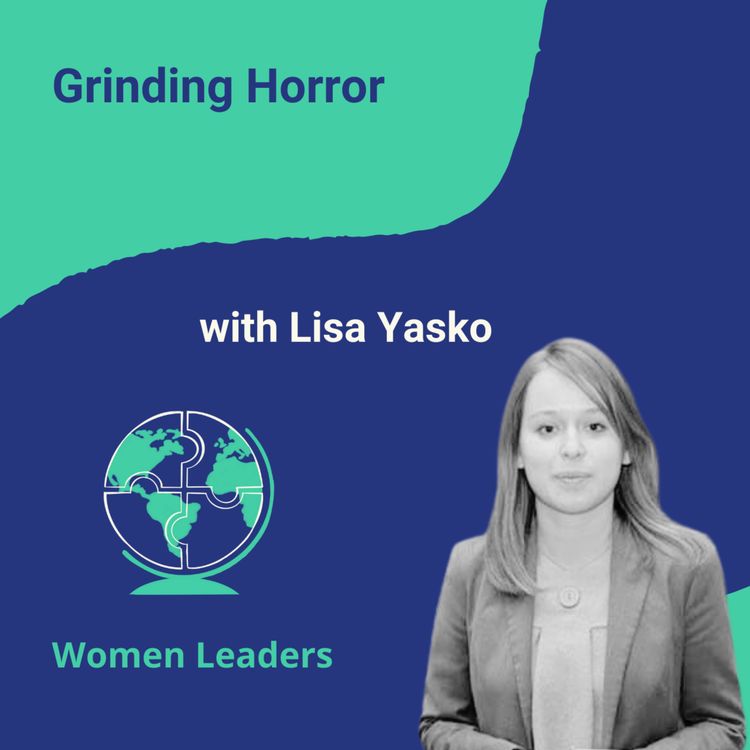
Women Leaders
Grinding Horror
Russia’s war of aggression in Ukraine is in its third year, with no end in sight. The Russian offensive in the East of Ukraine grinds on, consuming a mass of men and materiel on both sides while its conquest proceeds in tiny paces. The only surprise of the past few months was the Ukrainian incursion into Russia, taking a small square of the Kursk region. It is no minor achievement, not least given that Russia has not been invaded since WWII, and that the Kursk region is where the biggest tank battle — and one of the biggest battles ever — took place in the summer of 1943 between the then Soviet Union and Germany. But ultimately, the war grinds on, with Russia intensifying its drone attacks as well as ground assaults, ably supplied by Iranian drones and materiel, shored up by offerings from North Korea, and aided in a circuitous way by purchases of raw materials and weapons made through third countries, so circumventing western sanctions.
Ukraine is fighting back, using its own drones and weaponry in Russia and trying to fend off the invading Russian forces with the aid of Western weapons in Ukraine. But it is not enough. Between the fighting and the massive Russian drone and missile strikes at its energy grid now happening nearly daily, reality is difficult. And worse. To get a deep insight into this reality and what is both happening and should be happening to change the situation, Ilana Bet-El is joined by Lisa Yasko, Member of the Ukrainian Rada (parliament) and Head of the Ukrainian delegation to the Council of Europe Parliamentary Assembly. In a frank and revealing conversation, Lisa reflects on the war from its start, the daily reality in Ukraine, and the shortcomings of the international community.
This episode was recorded on 18 September 2024
Follow our guests:
You can also follow us
- Instagram @women_leaders_podcast
- Our partner European Leadership Network social media Twitter, LinkedIn & Facebook
- Our partner European Leadership Network website
- Ilana Bet-El
Credits
- Production: Florence Ferrando
- Music: Let Good Times Roll, RA from #Uppbeat (free for Creators!): https://uppbeat.io/t/ra/let-good-times-roll License code: ZXIIIJUU2ISPZIJT
- Supported by a grant from the Foundation Open Society Institute in cooperation with the Open Society Foundations
More episodes
View all episodes
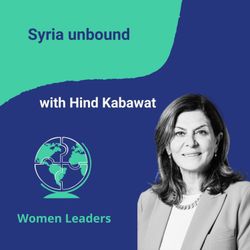
18. Syria unbound
39:52||Season 1, Ep. 18“How did you go bankrupt?" “Two ways. Gradually, then suddenly.” Novelist Earnest Hemingway put these words in the mouth of one of his characters in his 1926 breakthrough novel, The Sun Also Rises, and it seems they are as true to dictators as they are to a fictional gambler and drunk. Last weekend, President Bashar al Assad of Syria, the cruel and brutal head of a corrupt dynasty that had ruled Syria for over half a century, fled with his family to Moscow — just two weeks after a rebel group started upon an offensive from north to south. In retrospect, it became clear that the regime had been creaking gradually for some time, before it collapsed suddenly, leaving Iran and Russia, his two external supporters, bereft and the people of Syria free - or at least free from the regime. The freedom to decide their future is yet to be tested or understood.Hind Kabawat, a former member of the High Negotiations Committee at the Syrian peace talks in Geneva and a prominent leader of Syrian civil society, is one of the best-placed people to reflect on the past and especially the future of Syria. A native of Damascus who attended school with Bashar al Assad but has been standing in staunch opposition to him ever since she passionately believes in multi-faith collaboration as well as the importance of women. While applauding the fall of Assad, Professor Kabawat knows the future is yet to be decided - but that equality of different peoples of all faiths, genders, and political tribes must be at its centre.This episode was recorded on 12 December 2024Mentions and further resourcesIIIM – International, Impartial and Independent MechanismHayat Tahrir al Sham (HTS)Timeline of Arab Spring in SyriaFollow our guestHind Kabawat X/Twitter, LinkedIn and webpage (George Mason University)Tastakel, the non-profit Syrian women-led organisation working on building a democratic society on the basis of respect, justice & the rule of law.Follow usInstagram @women_leaders_podcastEuropean Leadership Network Twitter, LinkedIn, Facebook and websiteIlana Bet-ElCreditsProduction: Florence FerrandoMusic: Let Good Times Roll, RA from #Uppbeat
17. Germany all around
43:43||Season 1, Ep. 17The political landscape in Germany seems anything but stable. From unresolved disputes and coalitions failing to the publication of Angela Merkel’s memoirs - a timely reminder of a past ideal era - the nation faced mounting challenges. Economic struggles, extremism on the edge and upcoming early elections: a worrying mix for one key European player.Tanit Koch Schneider, journalist, co-host of the Focus Briefing and former editor-in-chief of the popular BILD, joins Ilana Bet-El to explain how and why the cherished German model went wrong, from the national situation following the elections three years ago, Chancellor Olaf Scholz, weaknesses to the multiple challenges and issues - and more!This episode was recorded on 28 November 2024Mentions and further resourcesTanit’s article on Merkel’s memoirs release (The New European)“Freedom: Memoirs 1954 - 2021” from Angela MerkelFollow our guestTanit Koch X/Twitter & [LinkedIn](https://www.linkedin.com/search/results/all/?fetchDeterministicClustersOnly=true&heroEntityKey=urn%3Ali%3Afsd_profile%3AACoAABenGA4BaEm2wOlqXbdvN8g7wLzGF2HV6tQ&keywords=tanit koch&origin=RICH_QUERY_SUGGESTION&position=0&searchId=85357a78-82ef-46e1-b5e0-3120cc0a07f9&sid=%3A(2&spellCorrectionEnabled=false)All her publicationsNewsletter Focus BriefingYou can also follow usInstagram @women_leaders_podcastOur partner European Leadership Network social media Twitter, LinkedIn & FacebookOur partner European Leadership Network websiteIlana Bet-ElCreditsProduction: Florence FerrandoMusic: Let Good Times Roll, RA from #Uppbeat (free for Creators!): https://uppbeat.io/t/ra/let-good-times-roll License code: ZXIIIJUU2ISPZIJT
16. Unpacking the U.S. elections
45:28||Season 1, Ep. 16The 2024 US elections were unique. From the last minute candidacy of Kamala Harris through the assassination attempt of Donald Trump to the sheer amount of money involved -- over US$ 15 billion -- events moved at an amazing speed, resulting in an unexpected definitive win for Trump and the Republican Party.Understanding what truly happened and capturing the real atmosphere across the U.S. may still be challenging, but necessary. To do this, Ilana Bet-El welcomes Elena Schneider, National Political Reporter at Politico U.S. Elena shares insights drawn from her extensive experience covering this and previous U.S. elections, touching on the current political landscape, media fragmentation, and how perceptions of power and strength remain deeply embedded in the electorate.This episode was recorded on 14 November 2024Mentions and further resourcesOur episode on Georgia electionsThe show All in the Family centers on a working-class White American family living in Queens, New York. Its patriarch, Archie Bunker is an outspoken, narrow-minded man, seemingly prejudiced against everyone not like him or his ideas of how people should be.Proportion of women in Congress Cost of 2024 US electionsFollow our guestElena Schneider X/Twitter & LinkedInAll her recent stories on PoliticoYou can also follow usInstagram @women_leaders_podcastOur partner European Leadership Network social media Twitter, LinkedIn & FacebookOur partner European Leadership Network websiteIlana Bet-ElCreditsProduction: Florence FerrandoMusic: Let Good Times Roll, RA from #Uppbeat (free for Creators!): https://uppbeat.io/t/ra/let-good-times-roll License code: ZXIIIJUU2ISPZIJT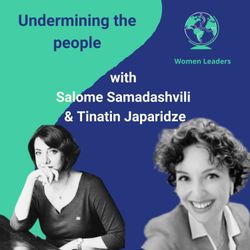
15. Undermining the people
47:40||Season 1, Ep. 15Election results should never be a foregone conclusion, and democratic upsets are a healthy feature of the system. Nonetheless, when the incumbent pro-Russian governing party in Georgia declared itself the winner of national elections on 26 October, with some 54% of the vote, there was a massive outcry: polls had predicted a win for the opposition. This is a huge setback for the cause of democracy in the state — and the region, given that just a week earlier, a referendum on European integration in Moldova had ended with a tiny margin of victory for the pro-EU camp when a near landslide had been predicted.The tentacles of autocracy are clearly reaching far and wide, tightening their grip upon the states surrounding Ukraine and bordering Europe — threatening both. To delve into these issues, Ilana Bet-El is joined by Salome Samadashvili, opposition Member of Parliament in Georgia, and Tinatin Japaridze, member of the Younger Generation Leaders Network (YGLN) and Eurasia Analyst at the Eurasia Group. This is a hard-hitting discussion on Georgia, the region, autocracy and democracy, covered with clarity, intellect and empathy.This episode was recorded on 31 October 2024Mentions and further resourcesSalome’s previous episode Georgia on the edgeTinatin’s book Stalin’s Millennials: Nostalgia, Trauma and NationalismFollow our guestsTinatin Japaridze LinkedIn, X/Twitter, Eurasie websiteSalome Samadashvil LinkedIn; X/TwitterYou can also follow usInstagram @women_leaders_podcastOur partner European Leadership Network social media Twitter, LinkedIn & FacebookOur partner European Leadership Network websiteIlana Bet-ElCreditsProduction**:** Florence FerrandoMusic: Let Good Times Roll, RA from #Uppbeat (free for Creators!): https://uppbeat.io/t/ra/let-good-times-roll License code: ZXIIIJUU2ISPZIJT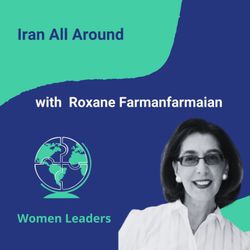
14. Iran All Around
41:20||Season 1, Ep. 14The speed of events in the disaster zone that is currently the Middle East is unrelenting. Just as attention was focused on Lebanon and refocused on Gaza, Israel announced the death of Yahiya Sinwar, head of Hamas and architect of the attacks on Israel on 7 October 2023. Across the West, and possibly beyond, this development was viewed with relief - if only because it may allow for a hostage deal to finally occur. But in Iran, the death called for the mourning of a Martyr. This is not by chance: Iran is a major protagonist in the region.From two missile attacks on Israel, to supporting Hizbollah, Hamas and the Houthis — Iran is perceived to be a malign presence across the Middle East, especially from the Western perspective. This is undoubtedly underpinned by its broken relations with the US, which dates back to the 1979-81 hostage crisis, coupled with its current closer relationship with China while also supplying armaments to Russia in its war of aggression against Ukraine.These are difficult positions for the Western mind, but they stem from the Iranian interest and perspective. To better understand both interest and perspective, Ilana Bet-El is joined by Dr Roxane Farmanfarmaian of Cambridge University in a strong and enlightening discussion that touches on the history of Iran and its international position since the 1979 Islamic Revolution, through the Iran-Iraq war of the 1990s, all the way to understanding its regional and global interests today.This episode was recorded on 14 October 2024MentionsThe Iran hostage crisis“A Brief History of Israeli-Iranian Cooperation and Confrontation” and “How Iran and Israel became archenemies”Roxane’s inspiration: An American Ramble: A Walk of Memory and Renewal by Neil King JrFollow:Roxane Farmanfarmaian LinkedIn, book “Blood & Oil: A Prince’s Memoir of Iran"Instagram @women_leaders_podcastEuropean Leadership Network Twitter, LinkedIn, Facebook & websiteIlana Bet-ElCreditsProduction: Florence FerrandoMusic: Let Good Times Roll Uppbeat
13. As Missiles Fly
44:52||Season 1, Ep. 13The constant escalation in the Middle East shows no signs of abating. October 7 marks a year since Hamas viciously invaded southern Israel, while October 8 is a year since Hezbollah started firing rockets into the north of Israel in support of Hamas. A year of unspeakable violence in Israel, Gaza and now Lebanon, rounded off by Iran firing some 200 ballistic missiles into Israel this week. A year of deaths and destruction for Palestinians, Israelis and Lebanese people.In this unique episode Women Leaders is building a bridge: Fania Oz-Salzberger, Professor of history at Haifa University and renowned public intellectual, and Roula from Beirut — her name for security purposes — join Ilana Bet-El In a fascinating, passionate and hard hitting episode. From explanations about Lebanese and Israeli politics to calls for women in decision making, and from the depths of despair to a future day in a new Middle East, this is the discussion necessary to understand the problems and the people of the region.This episode was recorded on 2 October 2024Mentions and further resourcesPeace NowFania’s article on Israeli perceptions on U.S ElectionWe asked after the recording our guests’ recommendations, just below:Fania’s recommendation “We will dance again” (trailer of the movie)Follow our guests:Fania Oz-Salzberger X/Twitter, LinkedIn, and academic publications (Academia.eu)For security reasons, we cannot follow Roula from BeirutFollow usInstagram @women_leaders_podcastOur partner European Leadership Network social media Twitter, LinkedIn & FacebookOur partner European Leadership Network websiteIlana Bet-ElCreditsProduction: Florence FerrandoMusic: Let Good Times Roll, RA from #Uppbeat (free for Creators!): https://uppbeat.io/t/ra/let-good-times-roll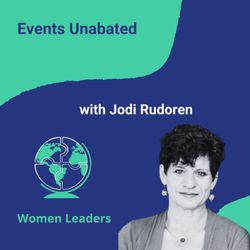
11. Events Unabated
48:31||Season 1, Ep. 11Summer used to be a period of quiet. The sun shone — or not — and holidays were taken, events slowed to a nearly non-existent pace, and newsrooms had to deal with what was known as the “silly season”. No longer. Whether because events really have become more dramatic or whether because we know about them immediately due to the constant digital connections, this past summer was an example of constant and rapid events: From the assassination attempt on Donald Trump to the sudden rise of Kamala Harris, both now presidential candidates in the US; and from the ongoing wars in Ukraine and Gaza/Israel to the hardening of the China-Russia partnership in the face of the west — the world carried on spinning unabated, and at speed.To get a closer insight into events in the US and the Middle East, Ilana Bet-El is joined by Jodi Rudoren, Editor in Chief of the Forward and former New York Times Bureau Chief in Jerusalem. In a strong and flowing conversation they move through the rapidly changing realities of US politics and the changing gender roles within them; the prospects of both presidential candidates policies on wars in Ukraine and the Middle East, and the appalling lack of women in the negotiations between Israel and the Palestinians — and elsewhere too.This episode was recorded 5 September 2024Mentions and further resourcesJodi and Roxanne's previous conversationFollow our guests:Jodi Rudoren LinkedIn & X/TwitterThe Forward websiteYou can also follow usInstagram @women_leaders_podcastOur partner European Leadership Network social media Twitter, LinkedIn & FacebookOur partner European Leadership Network websiteIlana Bet-ElCreditsProduction: Florence FerrandoMusic: Let Good Times Roll, RA from #Uppbeat (free for Creators!): https://uppbeat.io/t/ra/let-good-times-rollLicense code: ZXIIIJUU2ISPZIJTSupported by a grant from the Foundation Open Society Institute in cooperation with the Open Society Foundations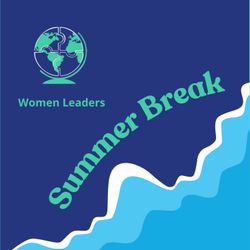
Women Leaders on their summer break
00:41||Ep. 0We know some of you have been wondering where we've been. Rest assured, Women Leaders will be back very soon. Get ready for more extraordinary conversations with inspiring women experts this September. Stay tuned!